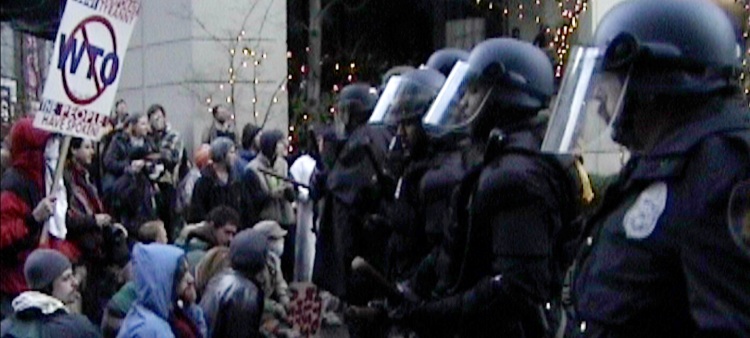WTO/99
Has it really been over a quarter of a century since the events chornicled in Battle in Seattle? I haven’t thought much about the end-of-the-century protests to the first meeting of the World Trade Organization on United States soil since the one and only Hollywood treatment of the events in 2007.
WTO/99 suggests that the protests that grew in violence and intensity were an inflection point in American social and political history — one whose importance exceeds the place the events hold in our cultural memory. After watching the documentary, it’s hard not to agree.
There is, of course, something depressingly generic about footage of protestors interacting violently with police. It was hard for me to watch some of this footage and not think footage of the protest turned riot at the Capitol in 2021. One notes drearily familiar patterns: escalating rhetoric, destruction of property, symbolic defacing or destruction of the American flag as a means of protest, and physical violence as an inevitable conclusion.
But what is more important than the similar manifestations that protests and impression took are the differences that motivated the encounters. Americans have short attention spans, and when we start insisting that events are unprecedented in the history of our country, we tend to undersell the cyclical nature of politics. What is strange is not seeing violent encounters between protestors and police but seeing a time where the lines between who was being called a terrorist and who was being called a fascist were not so ideologically rigid. The protestors include what I think would be characterized today as progressives (a C-SPAN clip of Bernie Sanders underscores that point), but they also include those against trade agreements who, one assumes today, would be more likely to vote Republican (a clip denouncing the trade agreements from Donald Trump’s 2000 presidential campaign underscores that point). Remember that time when a Democratic Mayor (Paul Schell) called on a Democratic President (Bill Clinton) to send the National Guard to put down anti-corporate protesters? The film does.
My point is not that history or media is biased for or against some party. It is, rather, that we rarely distance ourselves from current events long enough to really contemplate how quickly the ideological lines we think are eternal and intractable shift. Today’s pro-police crowd will have no problem bear-spraying law enforcement officers tomorrow. Those who call them government or its agent fascists for forcibly enforcing orders and laws are likely to express horror at their adversaries that use similar language or techniques in the future.
That’s not a particularly daring or original observation, so part of what makes WTO/99 work better than I expected is that it resists the urge to editorialize. It has a more neutral, “here’s what happened” tone that allows you to make connections (or not), comparisons (or not), and conclusions.
WTO/99 plays at the Full Frame Documentary Film Festival on Saturday, April 5. Tickets are available online or at the festival box office.

